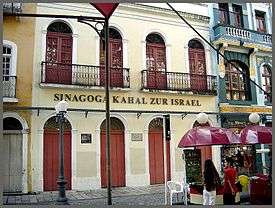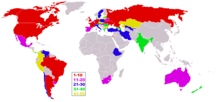History of the Jews in Brazil
| Judeus brasileiros יְהוּדִי ברזילאי | |
|---|---|
| Total population | |
| (107,329[1]–120,000[2] Jewish Brazilians) | |
| Regions with significant populations | |
| Mainly in the cities of São Paulo and Rio de Janeiro | |
| Languages | |
| Brazilian Portuguese · Hebrew. Other languages are also spoken such as Yiddish · Polish · Ladino, etc. | |
| Religion | |
| Judaism | |
| Related ethnic groups | |
| Brazilian people, Sephardi Jews, Mizrahi Jews and Ashkenazi Jews |
The history of the Jews in Brazil is a rather long and complex one, as it stretches from the very beginning of the European settlement in the new continent. Although only baptized Christians were subject to the Inquisition, Jews started settling in Brazil when the Inquisition reached Portugal, in the 16th century. They arrived in Brazil during the period of Dutch rule, setting up in Recife the first synagogue in the Americas, as early as 1636. Most of those Jews were Sephardic Jews who had fled the Inquisition in Spain and Portugal to the religious freedom of the Netherlands. In his The Wealth of Nations, Adam Smith attributed much of the development of Brazil's sugar industry and cultivation to the arrival of Portuguese Jews who were forced out of Portugal during the Inquisition.[3] (See History of Pernambuco#Jews in Pernambuco).
After the first Brazilian constitution in 1824 that granted freedom of religion, Jews began to arrive gradually in Brazil. Many Moroccan Jews arrived in the 19th century, principally because of the rubber boom, settling on the Amazon, where their mixed-race descendants continue to live. Waves of Jewish immigration occurred first by Russian and Polish Jews escaping pogroms and the Russian Revolution, and then during the 1930s during the rise of Nazis in Europe. In the late 1950s, another wave of immigration brought thousands of North African Jews. Nowadays, the Jewish communities thrive in Brazil. Some anti-Semitic events and acts have occurred, mainly during the 2006 Lebanon War such as vandalism of Jewish cemeteries.
Brazil has the ninth largest Jewish community in the world, about 107,329 by 2010, according to the Brazilian Institute of Geography and Statistics (IBGE) Census.[1] The Jewish Confederation of Brazil (CONIB) estimates that there are more than 120,000 Jews in Brazil.[2]
First Jewish arrivals

The Portuguese Jews, persecuted by the inquisition, stript of their fortunes, and banished to Brazil, introduced, by their example, some sort of order and industry among the transported felons and strumpets by whom that colony was originally peopled, and taught them the culture of the sugar-cane. Upon all these different occasions, it was not the wisdom and policy, but the disorder and injustice of the European governments, which peopled and cultivated America.[3]
—Adam Smith, The Wealth of Nations (1776)
There have been Jews in what is now Brazil since the first Portuguese arrived in the country in 1500, notably Mestre João and Gaspar da Gama who arrived in the first ships. A number of Sephardic Jews immigrated to Brazil during its early settlements. They were known as "New Christians" (Conversos or Marranos — Jews obliged to convert to Roman Catholicism by the Portuguese crown).
The Jews from Portugal avoided immigrating to Brazil, because it would also be persecuted by the Inquisition, most of the Portuguese Marranos took refuge in Mediterranean countries ( North Africa, Italy, Greece and the Middle East) and others emigrated to countries that tolerate Judaism, such as the Netherlands, England and Germany. Many sephardic Jews from Holland and England worked with the maritime trade of the Dutch West India Company, especially with the sugar production in the northeast of Brazil. The first Jews who arrived in North America were Sephardic Jews who after being expelled from Brazil by the Portugueses, settled in the American northeast.
In the final of 18th century, some Marranos came to southeastern Brazil to work in the gold mines. Many were arrested, accused of Judaism. Brazilian families which are descendants of Marranos are mainly concentrated in the states of Minas Gerais, Rio de Janeiro, Pará and Bahia.
Most sources state that the first synagogue of Belém, Sha'ar haShamaim ("Gate of Heaven"), was founded in 1824. There are, however, controversies; Samuel Benchimol, author of Eretz Amazônia: Os Judeus na Amazônia, affirms that the first synagogue in Belém was Eshel Avraham ("Abraham's Tamarisk") and that it was established in 1823 or 1824, while Sha'ar haShamaim was founded in 1826 or 1828.
The Jewish population in the capital of Grão-Pará had by 1842 an established necropolis.[4]
Agricultural settlements
Because of unfavorable conditions in Europe, European Jews began debating in the 1890s about establishing agricultural settlements in Brazil. At first, the plan did not work because of Brazilian political quarrels.[5]
In 1904, the Jewish agricultural colonization, supported by the Jewish Colonization Association (JCA) began in the state of Rio Grande do Sul, the southernmost state in Brazil. The main intention of the JCA in creating those colonies was to resettle Russian Jews during the mass immigration from the hostile Russian empire. The first colonies were Philippson (1904) and Quatro Irmãos (1912).[6] All these colonization attempts, however, failed because of "inexperience, insufficient funds and poor planning" and also because of "administrative problems, lack of agricultural facilities and the lure of city jobs."
In 1920, the JCA began selling some of the land to non-Jewish settlers.[5] Despite the failure, "The colonies aided Brazil and helped change the stereotypical image of the non-productive Jew, capable of working only in commerce and finance. The main benefit from these agricultural experiments was the removal of restrictions in Brazil on Jewish immigration from Europe during the 20th century."[6]
Other 20th century developments
By the First World War, about 7,000 Jews were inhabiting Brazil. In 1910 in Porto Alegre, capital of Rio Grande do Sul, a Jewish school was opened and a Yiddish newspaper, Di Menshhayt ("Humanity") was established in 1915. One year later, the Jewish community of Rio de Janeiro formed an aid committee for World War I victims.[5]
Congregação Israelita Paulista, the largest synagogue in Brazil, was founded in by Dr Fritz Pinkus, who was born in Egeln, Germany.[7]
Associação Religiosa Israelita, now a member of the World Union for Progressive Judaism, was founded by Dr. Heinrich Lemle, who emigrated from Frankfurt to Rio de Janeiro in 1941.[7]
Attitude towards antisemitism
Brazil strictly condemns antisemitism, and such act is an explicit violation of the law. According to Brazilian penal code, it is illegal to write, edit, publish, or sell literature that promotes anti-Semitism or racism.[8] The law provides penalties of up to five years in prison for crimes of racism or religious intolerance and enables courts to fine or imprison for two to five years anyone who displays, distributes, or broadcasts Antisemitic or racist material.[9]
In 1989, the Brazilian Senate passed a law prohibiting the manufacture, trade and distribution of swastikas for the purpose of disseminating Nazism. Anyone who violates this law is liable to serve a prison term from between two and five years.[10] (Law no. 7716 of 5 January 1989)
According to a US Department of State report, antisemitism in Brazil remains rare.[9] The results of a global survey on anti-Semitic sentiments, released by the Anti-Defamation League (ADL), ranks Brazil among the least anti-Semitic countries in the world. According to this global survey conducted between July 2013 and February 2014, Brazil has the lowest "Anti-Semitic Index" (16%) in Latin America and the third lowest in all Americas, only behind Canada (14%) and the United States (9%).[11][12]
Present-day Jewish community

Brazil has the 9th largest Jewish community in the world, about 107,329 according to the IBGE 2010 Census.[1] The Jewish Confederation of Brazil (CONIB) estimates that there are more than 120,000 Jews in Brazil,[2] with the lower figure representing active practitioners. The current Jewish community is composed by 75% of Ashkenazi Jews of Polish and German descent and also of 25% Sephardic Jews of Spanish, Portuguese, and North African descent; among the North African Jews, a significant number are of Egyptian descent.
Brazilian Jews play an active role in politics, sports, academia, trade and industry, and are overall well integrated in all spheres of Brazilian life. The majority of Brazilian Jews live in the State of São Paulo, but there are also sizeable communities in the States of Rio de Janeiro, Rio Grande do Sul, Minas Gerais, Pernambuco and Paraná.
Jews lead an open religious life in Brazil and there are rarely any reported cases of anti-semitism in the country. In the main urban centers there are schools, associations and synagogues where Brazilian Jews can practice and pass on Jewish culture and traditions. Some Jewish scholars say that the only threat facing Judaism in Brazil is the relatively high frequency of intermarriage, which in 2002 was estimated at 60%. Intermarriage is especially high among the country's Jews and Arabs.[13][14]
There has been a steady stream of aliyah (immigration to Israel) since the nation's foundation in 1948. Between 1948 and 2010, 11,586 Brazilian Jews immigrated to Israel.
Size of Jewish communities in Brazil
|
|
|
Other smaller Jewish communities include:
- In the state of Pernambuco: Arcoverde, Camaragibe and Olinda
- In the state of Rio de Janeiro: Barra do Piraí, Campos de Goytacazes, Macaé and São João de Meriti
- In the state of São Paulo: Araçoiaba da Serra, Araraquara, Boituva, Guaratinguetá, Itu, Mauá, Praia Grande, São José do Rio Preto, Taubaté, Ubatuba, Valinhos and Vinhedo
See also
- Dutch Empire
- Dutch Brazil
- Jewish Agency for Israel
- Kahal Zur Israel Synagogue
- List of Brazilian Jews
- List of Latin American Jews
- Oldest synagogues in the world#Recife, Brazil
- History of the Jews in Latin America
- Brazil–Israel relations
- History of Pernambuco#Jews in Pernambuco
References
- 1 2 3 Censo demográfico : 2010 : características gerais da população, religião e pessoas com deficiência [Census 2010: General characteristics of the population, religion and people with disabilities] (PDF) (in Portuguese). Instituto Brasileiro de Geografia e Estatística [Brazilian Institute of Geography and Statistics] (IGBE). Tabela 1.4.1 - População residente, por situação do domicílio e sexo, segundo os grupos de religião [Table 1.4.1 - Resident population, by household situation and sex, the religious groups]. ISSN 0104-3145. Retrieved September 7, 2016.
- 1 2 3 "Brazil". state.gov. US Department of State. Retrieved December 10, 2013.
- 1 2 Smith, Adam (1776), The Wealth of Nations (PDF) (Penn State Electronic Classics ed.), republication in 2005 by Pennsylvania State University of The Wealth of Nations, p. 476
- ↑ Scheinbein, Cássia (2006). "Línguas em extinção: o hakitia em Belém do Pará" [Endangered languages: the Hakitia in Belem] (PDF) (in Portuguese). Universidade Federal de Minas Gerais. p. 45.
- 1 2 3 Oreck, Alden. "Brazil". The Virtual Jewish History Tour. Jewish Virtual Library. Retrieved 2008-06-09.
- 1 2 Nachman, Falbel (2007-08-16). "Jewish agricultural settlement in Brazil" (PDF). Jewish History. Springer Netherlands. 21 (3–4): 325. doi:10.1007/s10835-007-9043-6. OCLC 46840526. Retrieved 2008-06-15. Lay summary – Spinger Link.
Jewish agricultural colonization in Brazil began in 1904 in the state of Rio Grande do Sul, supported by the Jewish Colonization Association (JCA). The JCA created the first colonies – Philippson (1904) and Quatro Irmãos (1912) – with the intention of resettling Russian Jews during the decisive years of mass immigration from the Russian empire.
No page; quote taken from abstract. - 1 2 Rosman, Kitty (October 2012). "The German roots of Brazil's largest synagogues". Jewish Renaissance. 12 (1): 16.
- ↑ "Brazil", International Religious Freedom Report 2010, Bureau of Democracy, Human Rights, and Labor, US Department of State, November 17, 2010, retrieved September 7, 2016
- 1 2 Brazil. US Department of State. Retrieved 2013-12-08.
- ↑ Legislation against Antisemitism and Holocaust denial. The Coordination Forum For Countering Antisemitism. Retrieved 2013-12-08.
- ↑ "Global survey on anti-Semitic sentiments". ADL.org. Anti-Defamation League. Retrieved May 21, 2014.
- ↑ Herald Staff (May 14, 2014). "Around 24% of the country holds anti-semitic sentiments". Buenos Aires Herald. Retrieved May 21, 2014.
- ↑ Weingarten, Sherwood L. (January 4, 2002). "Brazil's Jews face 60% intermarriage rate". JWeekly.com; J. the Jewish news weekly of Northern California. San Francisco Jewish Community Publications Inc. Retrieved September 7, 2016.
- ↑ Krieger, Hilary; Stoil, Rebecca (May 4, 2012). "Brazilian FM suggests Arab-Jewish intermarriage is a model for peace". Retrieved September 7, 2016.
- ↑ Dashefsky, Arnold; Sheskin, Ira M., eds. (2016), American Jewish Year Book 2015: The Annual Record of the North American Jewish Communities, Springer, p. 319, ISBN 9783319245058
- ↑ "Brazil - Modern-Day Community". jewishvirtuallibrary.org. Jewish Virtual Library. 2013. Retrieved 2013-12-22.
- ↑ Federação Israelita do Estado do Rio de Janeiro. "Comunidade Judaica do Rio de Janeiro" (in Portuguese). Retrieved 2010-10-26.
- ↑ "Federação Israelita do Rio Grande do Sul" (in Portuguese). 2009-05-29. Retrieved 2008-06-09.
- 1 2 3 4 5 6 7 8 9 10 11 12 13 14 15 16 17 18 19 20 21 22 23 24 25 26 27 28 29 30 31 32 33 34 35 36 37 38 39 40 41 42 43 44 45 46 47 48 49 50 51 52 53 54 55 56 57 58 59 60 61 62 63 64 65 66 67 68 69 70 71 72 73 74 75 76 77 78 79 80 81 Censo Demográfico Brasileiro de 2000. Instituto Brasileiro de Geografia e Estatística. 2000.
- ↑ Ricci, Daniele (2009-05-29). "Volta para casa: Restos mortais de três judeus deixam Piracicaba". Gazeta de Piracicaba (in Portuguese). Retrieved 2008-06-09.
- ↑ Telo da Côrte, Andréa (2009-05-29). "Judeus e Judeus: A Coletividade Judaica de Niterói e as Disputas pela Memória" (PDF) (in Portuguese). Retrieved 2008-06-09.
- ↑ Vainer Schuman, Lia (2009-05-29). "Produção de Sentidos e a Construção da Identidade Judaica em Florianópolis" (PDF) (in Portuguese). Retrieved 2008-06-09.
- ↑ Guimarães, Álvaro (2009-05-29). "Perdão e reverência no Sábado dos Sábados" (in Portuguese). Diário Popular. Retrieved 2008-06-09.
- ↑ "Prefeitura Municipal de Erechim" (in Portuguese). 2009-05-29. Retrieved 2008-06-09.
- ↑ Queirós, Amanda (2007-04-07). "Os judeus do Ceará" (in Portuguese). Retrieved 2010-05-28.
- ↑ Toledo, Marcelo (2001-03-11). "Ribeirão Preto terá a 1ª sinagoga da região" (in Portuguese). Retrieved 2010-05-27.
Further reading
Lesser, Jeffrey (1995). Welcoming the Undesirables: Brazil and the Jewish Question. Berkeley: University of California Press. ISBN 0-520-08413-6.
